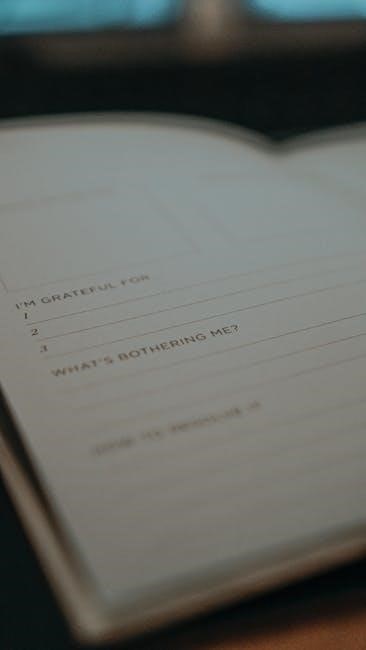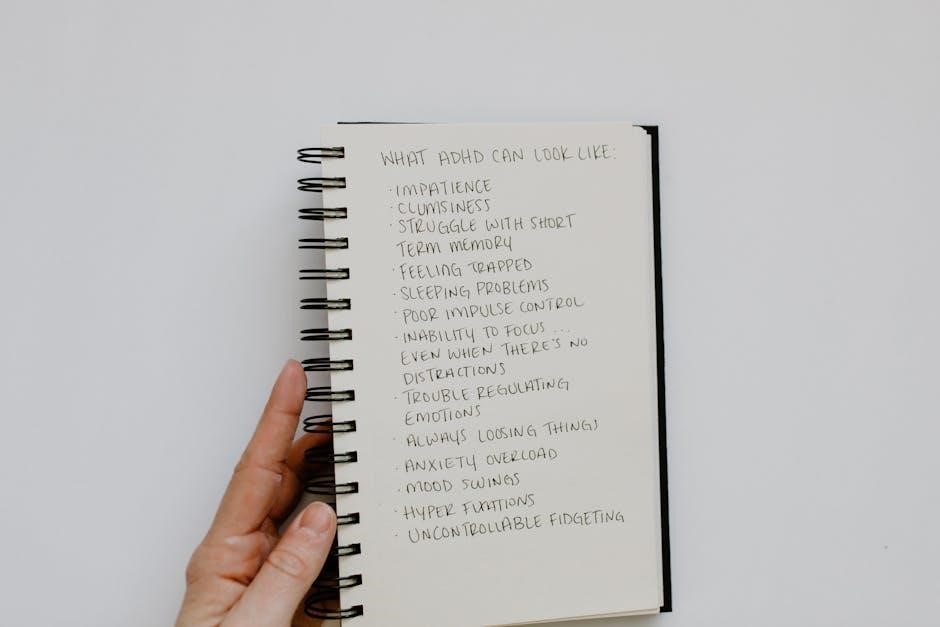Anxiety journaling offers a therapeutic outlet to process emotions and reduce anxiety․ This section explores its benefits‚ essential prompts‚ and tools to kickstart your mental well-being journey․
Understanding the Role of Journaling in Managing Anxiety
Journaling serves as a powerful tool for managing anxiety by providing a safe space to express and process emotions․ It helps identify triggers‚ reduce overwhelming thoughts‚ and gain clarity․ By documenting experiences‚ individuals can track patterns and develop coping strategies․ Research supports journaling as an effective method to alleviate stress and anxiety‚ promoting mental well-being․ Regular practice fosters self-reflection‚ allowing individuals to address underlying concerns and develop a healthier mindset․ With guided prompts from resources like anxiety journal PDFs‚ journaling becomes a structured and impactful practice for long-term emotional resilience․
Overview of Anxiety Journal Prompts and Their Benefits
Anxiety journal prompts offer structured exercises to explore thoughts and emotions‚ aiding in stress reduction and self-awareness․ These prompts‚ often found in anxiety journal PDFs‚ guide users to identify triggers‚ reflect on experiences‚ and cultivate gratitude․ By documenting feelings‚ individuals gain insights into anxiety patterns and develop coping strategies․ Benefits include improved emotional regulation‚ enhanced problem-solving skills‚ and a stronger sense of control․ Regular use fosters a mindset shift‚ helping individuals address fears and build resilience․ Free PDF resources provide accessible tools for those seeking to embark on this transformative practice‚ making journaling an approachable solution for managing anxiety effectively․

Benefits of Using an Anxiety Journal
Anxiety journals enhance emotional clarity‚ reduce stress‚ and foster self-awareness․ They help identify triggers and patterns‚ offering therapeutic relief and promoting personal growth through reflection and mindfulness practices․
How Journaling Reduces Stress and Anxiety
Journaling is a powerful tool for reducing stress and anxiety by providing an outlet to express emotions and process challenging thoughts․ By transferring internal struggles to paper‚ individuals can gain clarity and perspective‚ often feeling a sense of relief․ This practice helps identify patterns and triggers‚ allowing for better understanding and management of anxiety․ The act of writing can also serve as a therapeutic release‚ calming the mind and reducing overwhelm․ Over time‚ journaling fosters self-awareness and resilience‚ empowering individuals to navigate stressful situations with greater ease and confidence‚ leading to improved mental well-being and emotional stability․
The Therapeutic Effects of Writing Down Thoughts and Feelings
Writing down thoughts and feelings in a journal offers profound therapeutic benefits‚ particularly for anxiety․ This practice allows individuals to externalize their emotions‚ gaining clarity and reducing mental overload․ By articulating fears and worries‚ the brain processes them more effectively‚ diminishing their intensity․ Journaling also fosters self-reflection‚ helping to identify negative thought patterns and reframe them positively․ Over time‚ this process builds emotional resilience and enhances problem-solving skills‚ leading to better overall mental health and a greater sense of control over anxiety․ Regular writing can become a transformative habit‚ promoting lasting emotional well-being and personal growth․

Getting Started with an Anxiety Journal
Starting an anxiety journal involves selecting the right tools and setting clear goals․ Choose a comfortable format and establish a daily routine to foster consistency and reflection․
Choosing the Right Journal and Tools
Selecting the right journal and tools is crucial for a meaningful anxiety journaling experience․ Opt for a format that feels comfortable‚ whether a physical notebook or a digital app․ Consider tools like colorful pens or stickers to personalize your entries․ Many anxiety journal prompts PDFs offer structured exercises‚ from identifying triggers to cognitive restructuring․ Experiment with different layouts and designs to make your journal uniquely yours․ The goal is to create a space where you feel safe and inspired to express your thoughts openly․
Setting Realistic Goals for Daily Journaling
Establishing realistic goals is key to maintaining a consistent anxiety journaling practice․ Start with manageable commitments‚ such as journaling for 5-10 minutes daily or 3-4 times a week․ Gradually increase your frequency as the habit grows․ Celebrate small milestones to stay motivated․ For instance‚ aim to write about one prompt per session or dedicate time to reflection․ Setting clear‚ achievable objectives helps build a sustainable routine‚ ensuring journaling becomes a supportive and lasting tool for managing anxiety․ Consistency is more important than quantity‚ so tailor your goals to suit your lifestyle and energy levels․

Exploring Anxiety Journal Prompts
Discover effective prompts to guide your anxiety journaling journey‚ helping you identify triggers‚ practice gratitude‚ and foster positive reflections for improved mental clarity and emotional balance․
Common Prompts for Identifying Triggers and Patterns
Identifying triggers and patterns is crucial for managing anxiety․ Consider prompts like‚ “What situations often make me anxious?” or “What physical symptoms do I experience when anxious?” These questions help pinpoint specific triggers‚ such as certain environments or people‚ and reveal recurring patterns in your anxiety․ By documenting these insights‚ you can develop strategies to avoid or cope with triggers more effectively․ Over time‚ this practice enhances self-awareness and empowers you to take control of your emotional responses‚ leading to better mental health outcomes․ Regular reflection on these prompts fosters a deeper understanding of your anxiety‚ enabling proactive management․ Additionally‚ exploring how your thoughts and feelings correlate with specific events can uncover underlying causes of anxiety‚ allowing for more targeted interventions․ This process not only aids in reducing anxiety episodes but also promotes long-term emotional resilience․
Using Gratitude and Positive Reflection Exercises
Gratitude and positive reflection exercises are powerful tools in anxiety journaling․ Prompts like “List 10 things you’re grateful for today” or “Reflect on a positive memory” help shift focus from anxiety to joy․ These exercises cultivate a mindset of appreciation‚ reducing stress and fostering resilience․ By regularly practicing gratitude‚ you can rewire your brain to notice the good in life‚ even during challenging times․ Positive reflection also encourages self-compassion and celebration of personal growth‚ reinforcing mental well-being․ Over time‚ these practices become a cornerstone of emotional balance‚ helping you navigate anxiety with greater ease and optimism; Consistency is key to their effectiveness․

Advanced Techniques for Anxiety Journaling
Explore advanced techniques like grounding and mindfulness to deepen your anxiety journaling practice․ Discover how reflecting on progress over time can enhance mental clarity and emotional resilience‚ guiding you toward lasting peace and self-awareness․
Grounding Techniques and Mindfulness Practices
Grounding techniques and mindfulness practices are powerful tools to enhance anxiety journaling․ By focusing on the present moment‚ individuals can reduce overwhelming thoughts․ Techniques like deep breathing exercises‚ sensory observations‚ and guided meditations help calm the mind․ Incorporating these practices into journaling sessions can create a safe space for self-expression․ Writing about grounding experiences‚ such as describing five things you can see or hear‚ can anchor you in reality․ Mindfulness prompts encourage reflection on emotions without judgment‚ fostering a deeper connection to your inner self and promoting emotional balance․ Regular practice strengthens mental resilience‚ aiding in long-term anxiety management․
Reflecting on Progress and Growth Over Time
Reflecting on past journal entries reveals personal growth and progress in managing anxiety․ Regularly reviewing your journal highlights patterns‚ successes‚ and areas for improvement․ This practice fosters self-awareness and motivation․ By documenting milestones‚ such as reduced anxiety episodes or improved coping strategies‚ you can celebrate achievements․ Prompts like “What progress have I made?” or “How have my thoughts changed?” encourage introspection․ Over time‚ this reflection builds confidence and reinforces the effectiveness of journaling as a tool for mental health․ Seeing growth inspires continued commitment to self-care and emotional well-being‚ making journaling a valuable long-term practice for anxiety management․
Anxiety journaling significantly impacts mental health‚ offering empowerment and self-discovery․ Free PDFs provide accessible tools for consistent practice‚ fostering growth and improved well-being over time․
The Long-Term Impact of Consistent Journaling on Mental Health
Consistent journaling fosters resilience and emotional balance‚ reducing anxiety over time․ By documenting thoughts and feelings‚ individuals gain clarity‚ develop coping strategies‚ and cultivate gratitude․ Regular practice enhances self-awareness‚ helping to identify patterns and triggers‚ which are crucial for long-term mental well-being․ Many find that journaling becomes a therapeutic habit‚ leading to sustained improvements in stress management and overall mental health․ Over time‚ this practice not only alleviates anxiety but also promotes personal growth and a more positive outlook on life․
Final Thoughts on Embracing Journaling as a Lifestyle
Embracing journaling as a lifestyle transforms mental health care into a daily habit of self-care and reflection․ It encourages mindfulness‚ gratitude‚ and personal growth‚ offering a space for honest expression․ Over time‚ journaling becomes a trusted companion‚ helping to navigate life’s challenges with clarity and resilience․ By integrating this practice‚ individuals foster a deeper connection with their thoughts and feelings‚ leading to a more balanced and fulfilling life․ Journaling is not just a tool for managing anxiety but a lifelong journey toward emotional well-being and self-discovery․



